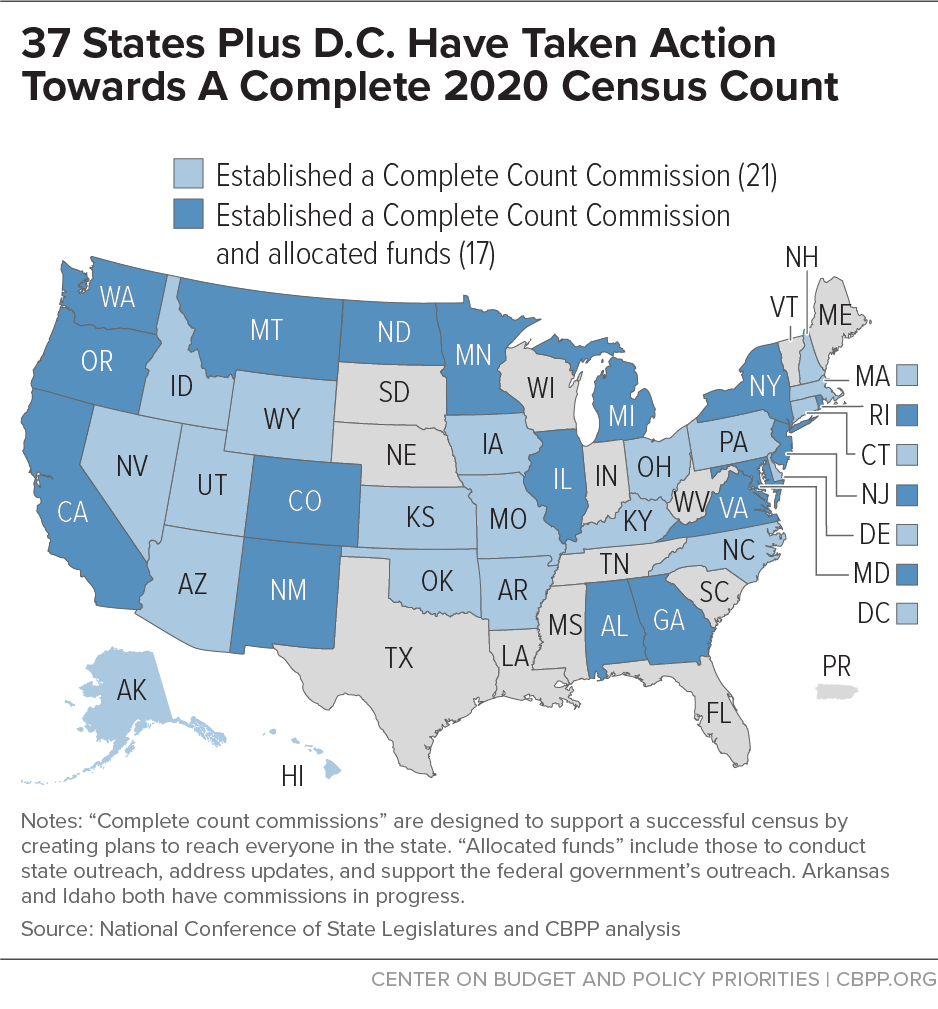- Home
- State Budget And Tax
- States Can Help Ensure A Complete 2020 C...
States Can Help Ensure a Complete 2020 Census Count
The federal government is responsible for conducting a fair and accurate census every ten years, but that’s in jeopardy for 2020. Years of inadequate and delayed federal funding and the Trump Administration’s failed efforts to add an untested citizenship question to the form threaten to reduce participation. Therefore, states should take steps now to help ensure a full and accurate census count.
States have much at stake in a 2020 census count, including fair representation in Congress and substantial federal funding. House seats are apportioned based on population and, in 2016, the federal government distributed over $900 billion to states and the District of Columbia through 325 census-guided programs and projects including Medicaid, highway planning and construction, child care assistance, and foster care.
States can help ensure a complete census count by allocating funds to supplement the federal government’s efforts and forming “complete count commissions” dedicated to ensuring that everyone living within their borders is counted.
Many Communities at Risk of Not Being Fully Counted
Many communities and population groups are at risk of not being fully counted, including:
- Young children
- People in rural areas
- Communities of color
- People who earn low wages
- Immigrants
- Lesbian, gay, bisexual, transgender, and queer people
People in these communities face significant barriers to census participation for various reasons, including geographic isolation, limited language assistance, limited internet access, housing instability, and anti-immigrant rhetoric by officials that could prompt some immigrants to fear participating in the count.
Such an undercount could further reinforce barriers to opportunity by denying communities accurate state and federal political representation that’s determined by population numbers; local, state, and federal funds that they might otherwise receive; and private-sector investments, such as jobs and stores, that companies make using census data.
2020 Census Has Been Underfunded; Blocked Citizenship Question Could Chill Participation
Underfunding and funding delays during key planning and preparation years forced the Census Bureau to cancel key tests and have left it struggling to catch up in the pivotal years before 2020. Additionally, the Administration’s attempts to add an untested citizenship question on the census form disrupted Bureau planning. The Supreme Court rejected the Administration’s rationale for adding the question in June 2019, and the Administration has ceased pursuing the addition. Although the efforts to add the question failed, publicity around them may nevertheless make immigrants more fearful of responding to the census.
States Can Act to Fully and Accurately Count All Communities
Given these challenges to an accurate census, states should:
- Allocate funding to conduct outreach within their borders and provide other support to supplement the Census Bureau’s outreach and promotion activities, especially in encouraging participation among communities at risk of not being fully counted. These funds can help bolster the efforts of state “complete count commissions” (described below) to reach state residents. Seventeen states have allocated such funding to date (see map). Eight states (Colorado, Illinois, Montana, New Jersey, New Mexico, New York, North Dakota, and Rhode Island) appropriated funds in 2019. States can still contribute to a successful count by allocating funds for outreach in 2020.
- Establish complete count commissions. These state-run commissions help amplify the importance of census participation to state residents through activities including creating plans to promote census participation in all areas, identifying “trusted messengers” to conduct community outreach, and creating and translating educational materials to supplement the Census Bureau’s communications campaigns. Thirty-seven states and the District of Columbia have established these commissions; 17 have also allocated funds for outreach. Seventeen states plus the District of Columbia established complete count commissions in 2019, and several states that have not yet done so are considering it.
